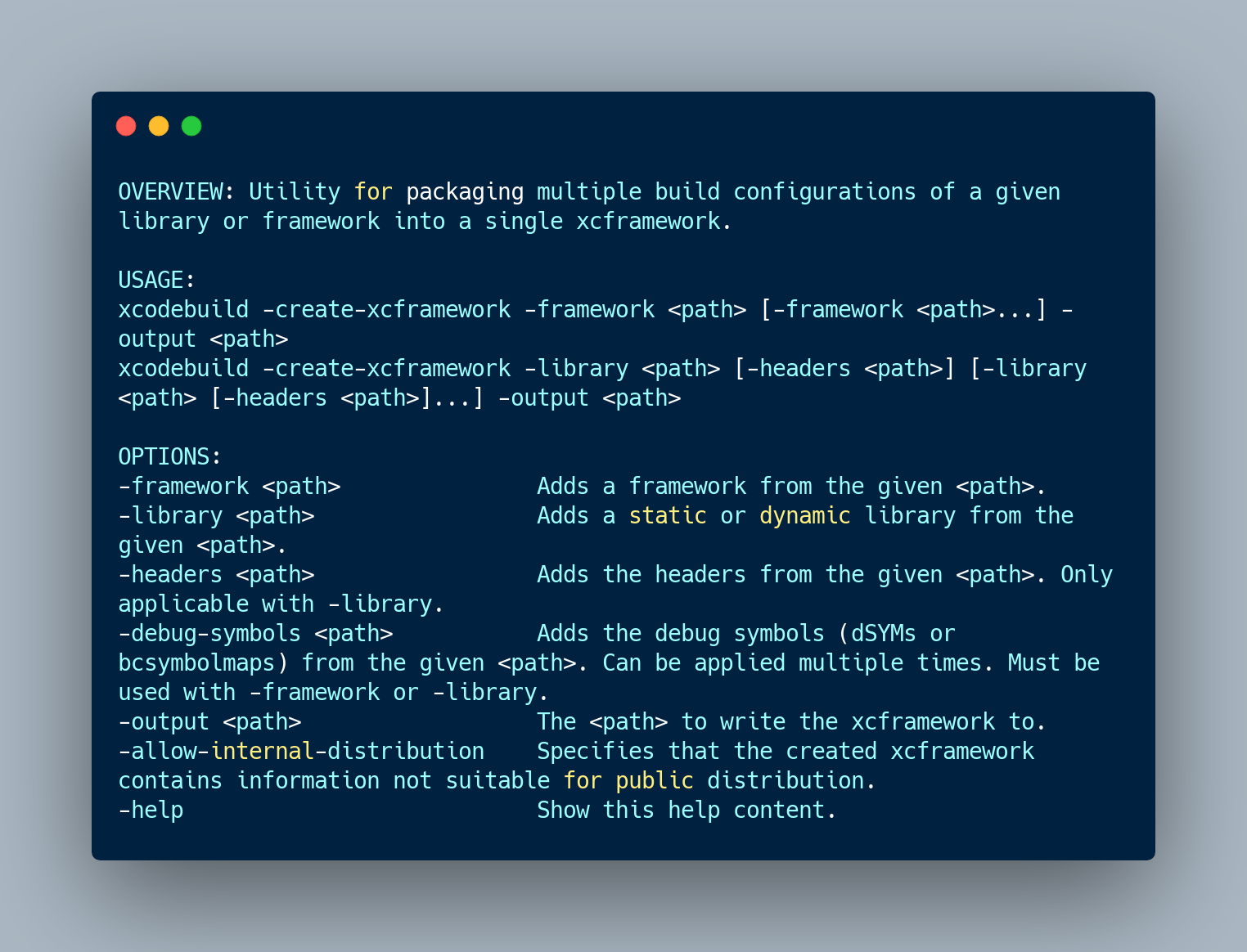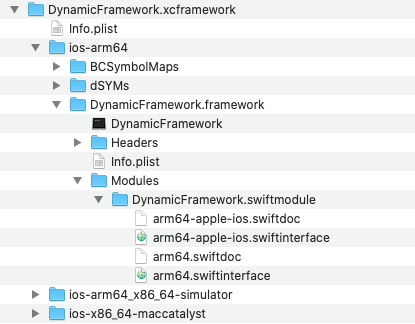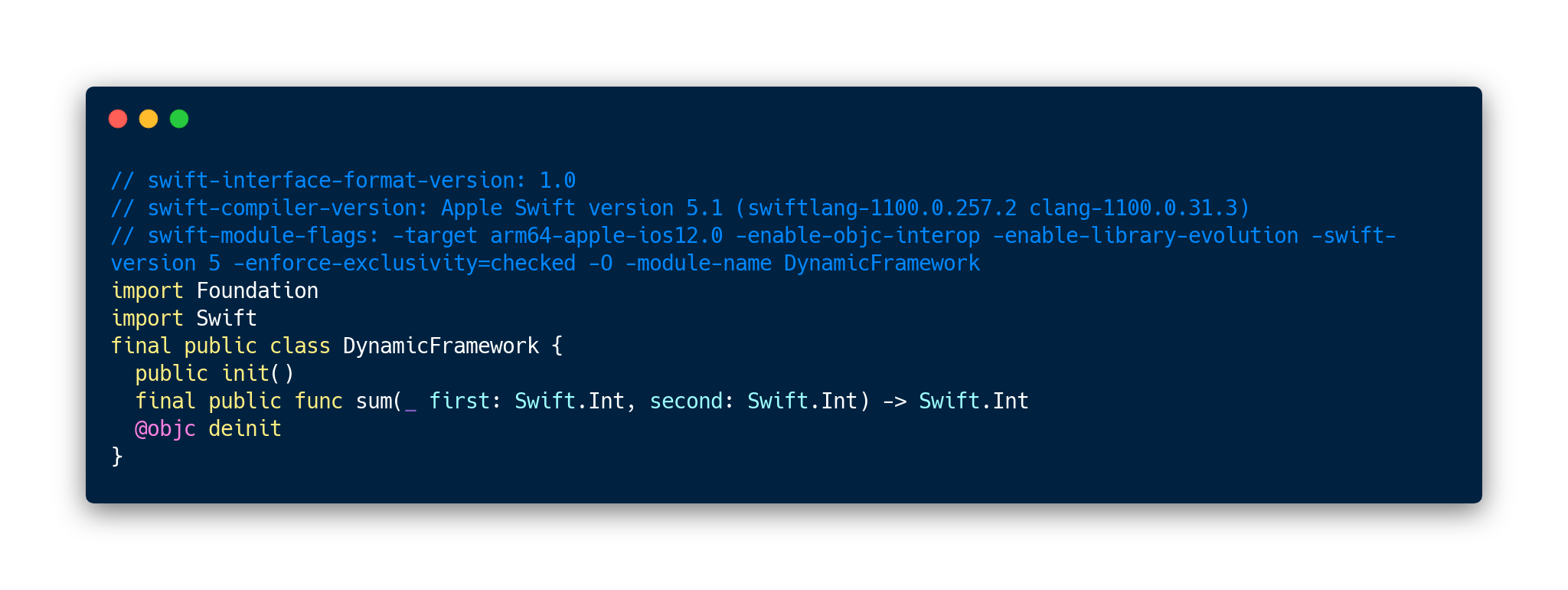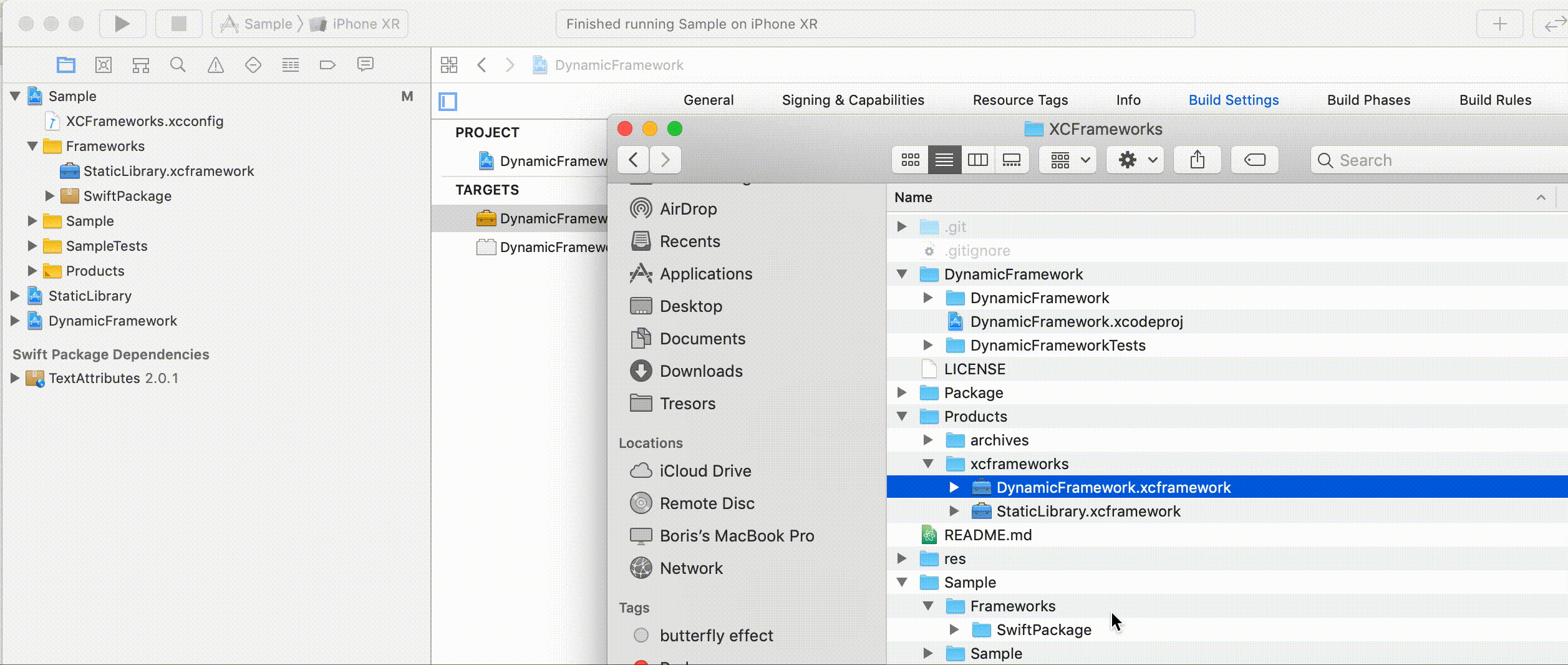bielikb / Xcframeworks
Projects that are alternatives of or similar to Xcframeworks
xcframeworks repo
This is a demonstration of creating and integrating the xcframeworks and their co-op with static libraries and Swift packages within the same Xcode project.
Table of contents
- Changelog
- Introduction: New .xcframework format
- How to create .xcframework that contain iOS + iOS Simulator platforms
- Create xcframework using fastlane plugin
- Testing & Troubleshooting
- Distribution of xcframeworks
- How to integrate .xcframework in your project
- What's in XCFrameworks workspace
- Materials
Pre-requisities
- Xcode 11 and above
- Swift 5.1 and above
- Github/Gitlab/Bitbucket account set in Xcode's account preferences
Changelog
| What's new | Xcode version | Swift version | Description |
|---|---|---|---|
| Module stable binaries | Xcode 11 | Swift 5.1 | Library evolution allows the library authors to distribute module stable Swift binaries |
| New version of .swiftinterface interface | Xcode 11.4 | Swift 5.2 | New annotations added to Swift @_inheritsConvenienceInitializers, @_hasMissingDesignatedInitializers. ⚠️ Module interfaces aren't backwards compatible, clients using Swift 5.1.3 and below won't be able to compile Swift binaries compiled with Swift 5.2. More info here
|
| Support for binary dependencies in SwiftPM | Xcode 12.0 | Swift 5.3 | Swift Package Manager now supports declaring binary targets in Package.swift
|
| Debug symbols | Xcode 12.0 | Swift 5.3 | Debug symbols (dSYMs, BCSymbolMaps) can be included within the xcframework through new -debug-symbols <absolute path> flag |
Introduction: New .xcframework format
Requirements
- Xcode11
- Swift 5.1 and above
Motivation & consequences
-
introduce standard format to gain module stability for your Swift frameworks & libraries. Library author & client of a library are no longer required to use the same version of compiler. Please note, that the module stable interfaces are only forward-compatible
-
provide seamless experience when creating & integrating the module stable frameworks
-
support all Apple platforms and architectures NOTE: while
fat frameworkcan support module stability, thelipocommand line tool, that is used to fuse the frameworks together, is not officially supported by Apple. Also usinglipotools falls short in cases of fusing two platforms with similar architectures together - e.g. arm6 architecture can be found in iOS + watchOS. -
STOP creating & using
fat frameworks== no morelipo. -
STOP slicing frameworks by stripping the architectures in your projects' targets' custom
build-phase.
Contents of xcframework
This format bundles module-stable frameworks (.swiftinterface) for the platforms of interest.
The Info.plist contains all available frameworks in a bundle specified by library identifiers. This information is used by Xcode during the linking time => xcodebuild picks the right framework for the platform we're building against. Since Xcode 12.0 the xcframework can contain also debug symbols (dSYMs, BCSymbolMaps).
The structure of xcframework looks as shown below
Size of xcframework
During my tests I realized, the size of an xcframework was smaller than the size of an corresponding fat framework. I tested swift only & mixed frameworks.
Generally the lipo commandline tool adds a bit of overhead for all contained architectures.
Platforms
xcframework supports all Apple platforms & their variants - iOS, maccatalyst, macOS, tvOS, watchOS, iPadOS, carPlayOS.
List of destinations
| Platform | Destination |
|---|---|
| iOS | generic/platform=iOS |
| iOS Simulator | generic/platform=iOS Simulator |
| maccatalyst | generic/platform=macOS,variant=Mac Catalyst |
| iPadOS | generic/platform=iPadOS |
| iPadOS Simulator | generic/platform=iPadOS Simulator |
| macOS | generic/platform=macOS |
| tvOS | generic/platform=tvOS |
| watchOS | generic/platform=watchOS |
| watchOS Simulator | generic/platform=watchOS Simulator |
| carPlayOS | generic/platform=carPlayOS |
| carPlayOS Simulator | generic/platform=carPlayOS Simulator |
How to create .xcframework that contain iOS + iOS Simulator platforms
This section describes the process of creating the xcframework by archiving & creating the final xcframeworks from 2 archives built for iOS & iOS Simulator.
However, if you're not interested in the details of the process of how the xcframework is created, head directly to section: Create xcframework using fastlane plugin.
1. Archive your scheme for desired platforms (destinations)
1.1 Pass SKIP_INSTALL=NO && BUILD_LIBRARY_FOR_DISTRIBUTION=YES to archive your scheme
xcodebuild archive \
-workspace MyWorkspace.xcworkspace \
-scheme MyScheme \
-destination destination="generic/platform=iOS" \
-archivePath "archives/MyScheme-iOS" \
SKIP_INSTALL=NO \
BUILD_LIBRARY_FOR_DISTRIBUTION=YES
1.2 iOS Simulator - archive your scheme for iOS Simulator platform by specifying correct destination destination="generic/platform=iOS Simulator" & point archivePath to architecture specific path, e.g. archives/MyScheme-iOS-Simulator.
xcodebuild archive \
..
-destination destination="generic/platform=iOS Simulator" \
-archivePath "archives/MyScheme-iOS-Simulator" \
..
1.3 iOS - archive your scheme for iOS by specifying destination="generic/platform=iOS" & point archivePath to device specific path. The architecture specific path will ensure the archive from step 2. wont be overwritten, e.g. MyScheme-iOS
xcodebuild archive \
..
-destination destination="generic/platform=iOS" \
-archivePath "archives/MyScheme-iOS" \
..
Locations
Binaries in .xcarchive are located under:
-
Products/Library/Frameworksfolder for dynamic frameworks -
Products/usr/local/libfolder for static libraries
2. Create .xcframework from built archives
xcodebuild allows you to create xcframework by specifying frameworks, libraries or even can add headers to the libraries.

1. Specify all frameworks or libraries that you want to add into .xcframework
2. Specify the outpath path using -output argument. Don't forget to add .xcframework extension to your output path.
xcodebuild -create-xcframework \
-framework My-iOS.framework \
-debug-symbols <absolute path to dSYM or BCSymbolMaps folder in the xcarchive> # available from XCode 12.0+
-framework My-iOS_Simulator.framework \
-debug-symbols <absolute path to dSYM or BCSymbolMaps folder in the xcarchive> # available from XCode 12.0+
-output My.xcframework
Module stability is gained with Xcode 11 + Swift 5.1, once your module declares .swiftinterface file, that describes the public interface of your framework along with linker flags, used toolchain and other info. Swift interface can be found under your framework's swiftmodule folder.
.swiftinterface file is autogenerated when xcframework is created.
Create xcframework using fastlane plugin
This plugin allows you to generate the xcframework (including all dSYMs & BCSymbolMaps) by specifying the desired destinations.
E.g. destination [iOS] will generate xcframework that contains slices for both iOS & iOS Simulator.
⚠️ Currently the plugin doesn't support static libraries.
- Add plugin to your project
fastlane add_plugin create_xcframework
- Add lane to your
Fastfile
desc "Export xcframework"
lane :export_xcframework do
create_xcframework(
workspace: 'path/to/your.xcworkspace',
scheme: 'name of your scheme',
destinations: ['iOS', 'maccatalyst'],
xcframework_output_directory: 'Products/xcframeworks'
)
end
NOTE:
Version 1.1.0 of the fastlane plugin includes support for debug symbols.
You can try out the plugin in this project by calling following command:
bundle exec fastlane export_xcframework
Testing & Troubleshooting
Make sure to always build & run your generated xcframework before distributing it to your clients. Few of the problems will unveil just at the compile or run time, so don't rely solely on the success of the xcframework creation.
Here's the list of compiler errors I got across when integrating built xcframework into Xcode project.
| Problem | Severity | Description | Solution |
|---|---|---|---|
Redundant conformance of x to NSObjectProtocol
|
error - thrown at dynamic linking time | Your class is already subclassed from NSObject, which conforms to NSObjectProtocol
|
Check protocol conformances of your classes and remove redundant conformance to NSObjectProtocol
|
| Use of unimplemented initializer 'init()' for class | error - thrown at dynamic linking time | Objective-C ABI public classes need to provide public init |
Provide public init override for your public class: override public init()
|
@objc' class method in extension of subclass of Class X requires iOS 13.0.0 |
error | Rules for interoperability with Objective-C has changed since iOS 13.0.0. and currently doesn't support @objc interoperability in class extensions. There's open question on Swift forums
|
Move/Remove @objc declaration from your Swift class extension |
| scoped imports are not yet supported in module interfaces | warning | Read more about Swift import declarations here: https://nshipster.com/import/ | Import the module instead of specific declaration. For example: change import class MyModule.MyClass to import MyModule
|
| Can’t use framework compiled with Swift 5.2 in Swift 5.1.3 project | error - thrown at linking time | The xcframework was generated using the Swift 5.2 and above. Module stable interfaces are not backwards-compatible. | Update your Xcode to Xcode 11.4 and above or generate module stable binary using Xcode 11.3 and below |
| Incompatible module | error - thrown at linking time | The module built for iOS Simulator shares the same arch slice as the new M1. | Exclude arm64 slice when building your xcframework by specifying following build setting: EXCLUDED_ARCHS[sdk=iphonesimulator*] = arm64 |
Distribution of xcframeworks
- manually
Distribution of xcframeworks using the native dependency manager Swift Package Manager or the 3rd party dependency managers does come with several reported integration issues. Manual integration seems sofar to be the safest/bullet-proof integration option.
-
Swift Package Manager
- binary targets are supported since Xcode 12.0
- define binary target in your Swift Package manifest.
- zipped xcframework filename should contain the version number
- compute the binary checksum by calling
swift package compute-checksum <xcframework filename. - use the computed binary checksum in your Swift Package manifest, when referencing the xcframework remotely.
-
CocoaPods
- supported since v1.9.1, several important bug-fixes came with the version 1.10.0
- As a vendor, you might consider limiting the cocoapods pods audience to avoid any unnecessary issues by specifying the minimum cocoapods version required: eg `spec.cocoapods_version = '>= 1.10.0'``
- use
vendored_frameworksto specify you xcframework(s) in your podspec. e.g.spec.vendored_frameworks = 'DynamicFramework.xcframework' - specify paths to your dSYMs and xcframework in
spec.preserve_paths = [...], since Xcode 12 the xcframeworks can contain symbol files, so there's no need to distribute the symbol files explicitly
-
Carthage
- Since version 0.37.0 Carthage produces xcframeworks for open-sourced depdendencies when
--use-xcframeworksflag is passed. It doesn't support fetching already existing xcframeworks.
- Since version 0.37.0 Carthage produces xcframeworks for open-sourced depdendencies when
How to integrate .xcframework in your project
- Drag & drop .xcframework manually into your project's target
- Embed & sign .xcframework in your project's target
What's in XCFrameworks workspace
XCFrameworks workspace consists of:
-
StaticLibraryproject - represents static library project -
DynamicFrameworkproject - represents project that builds dylib -
Swift Package- Swift Package for internal development (within Sample project) -
TextAttributes- external Swift Package -
Sample- Sample project that includes all of the dependencies mentioned above.
Materials
Binary Frameworks in Swift
https://developer.apple.com/videos/play/wwdc2019/416/
Distribute binary frameworks as Swift packages
https://developer.apple.com/wwdc20/10147 https://developer.apple.com/documentation/swift_packages/distributing_binary_frameworks_as_swift_packages
ABI Stability & Module Stability - swift.org
https://swift.org/blog/abi-stability-and-more/
Library evolution in Swift - swift.org
https://swift.org/blog/library-evolution/
Library evolution for stable ABIs
https://github.com/apple/swift-evolution/blob/master/proposals/0260-library-evolution.md
Library evolution - Docs
https://github.com/apple/swift/blob/master/docs/LibraryEvolution.rst
Swift Unwrapped - Swift 5.1 with Doug Gregor (Library evolution, ...)
https://spec.fm/podcasts/swift-unwrapped/308610
Alexis Beingessner - How Swift Achieved Dynamic Linking Where Rust Couldn't
https://gankra.github.io/blah/swift-abi/





